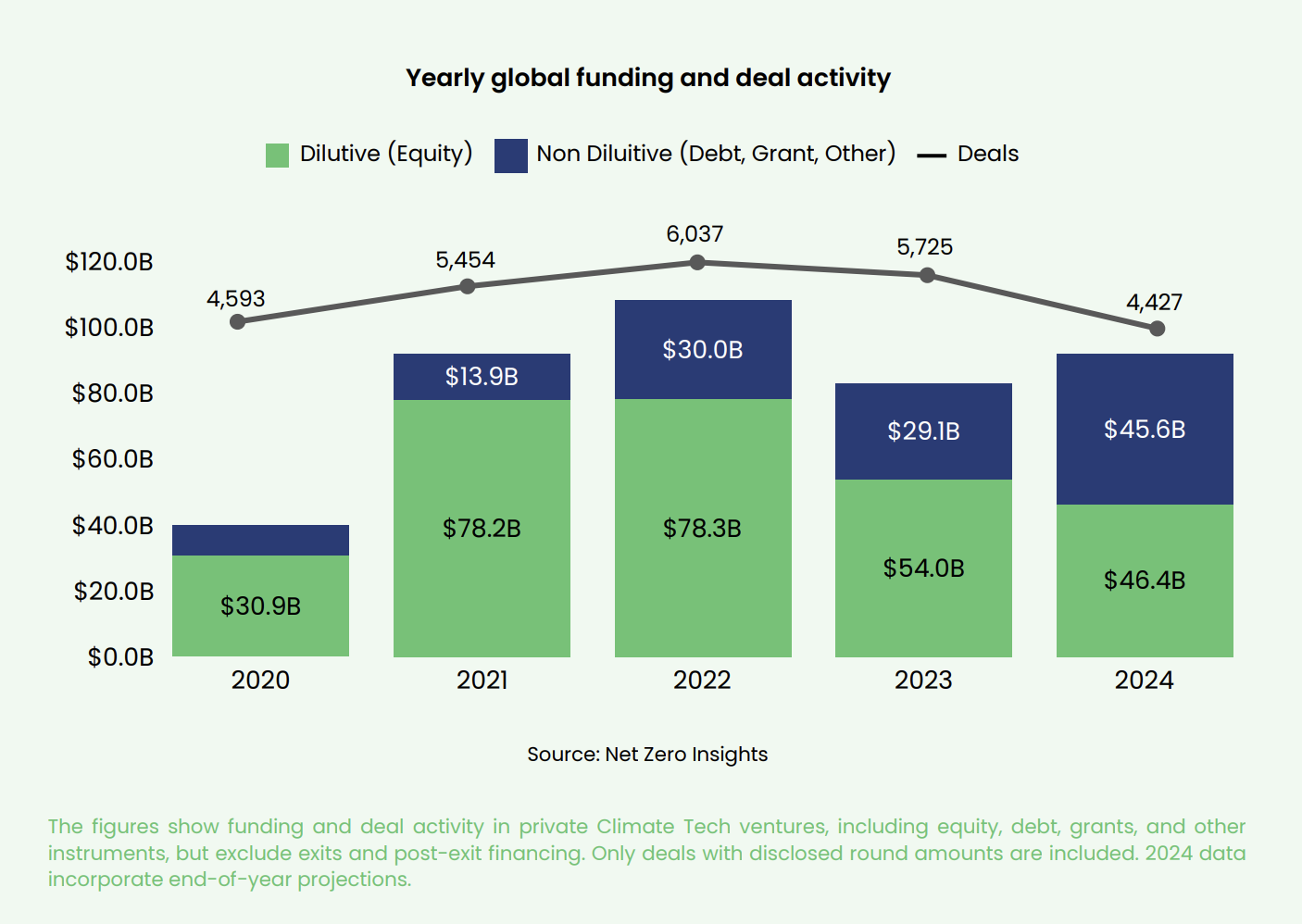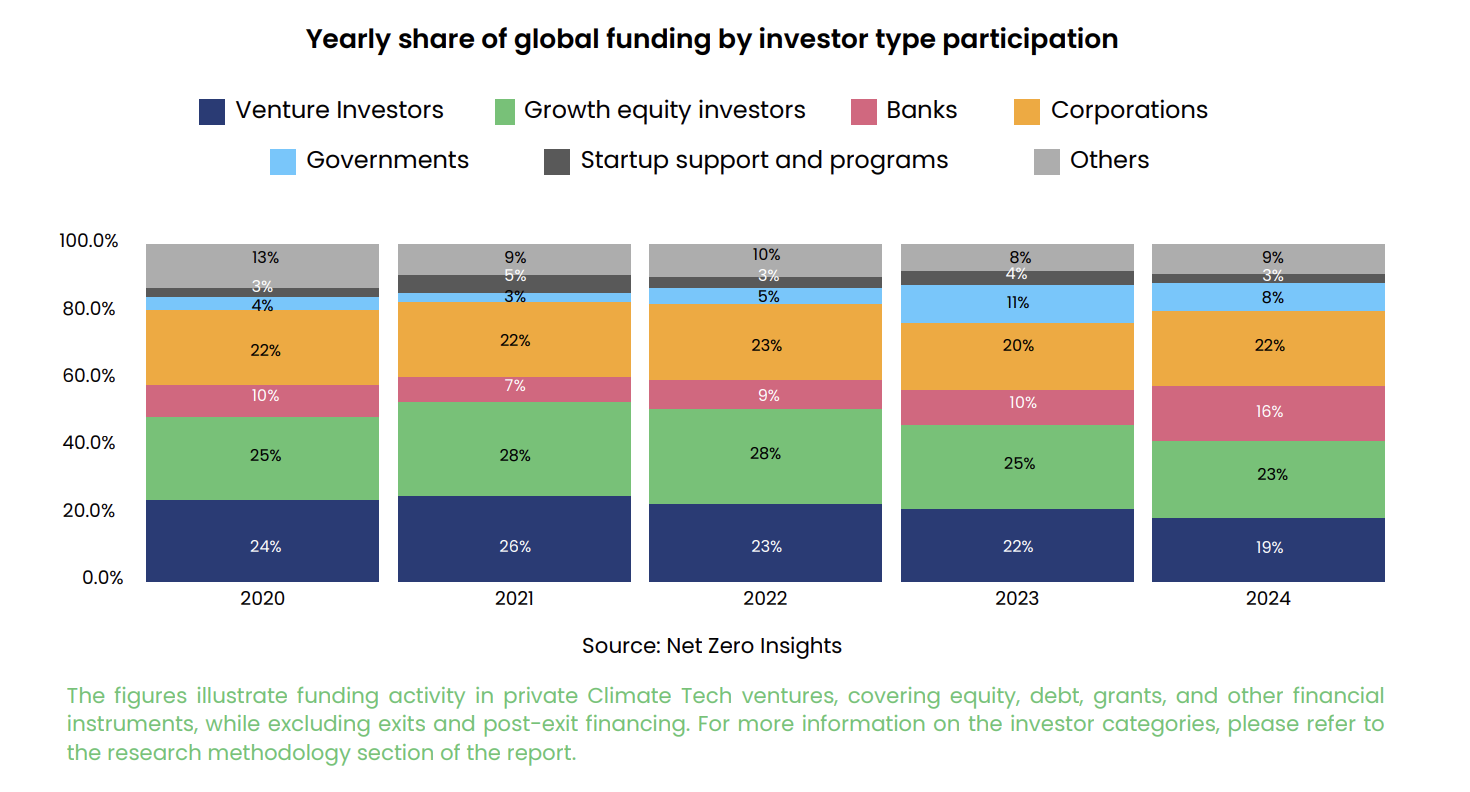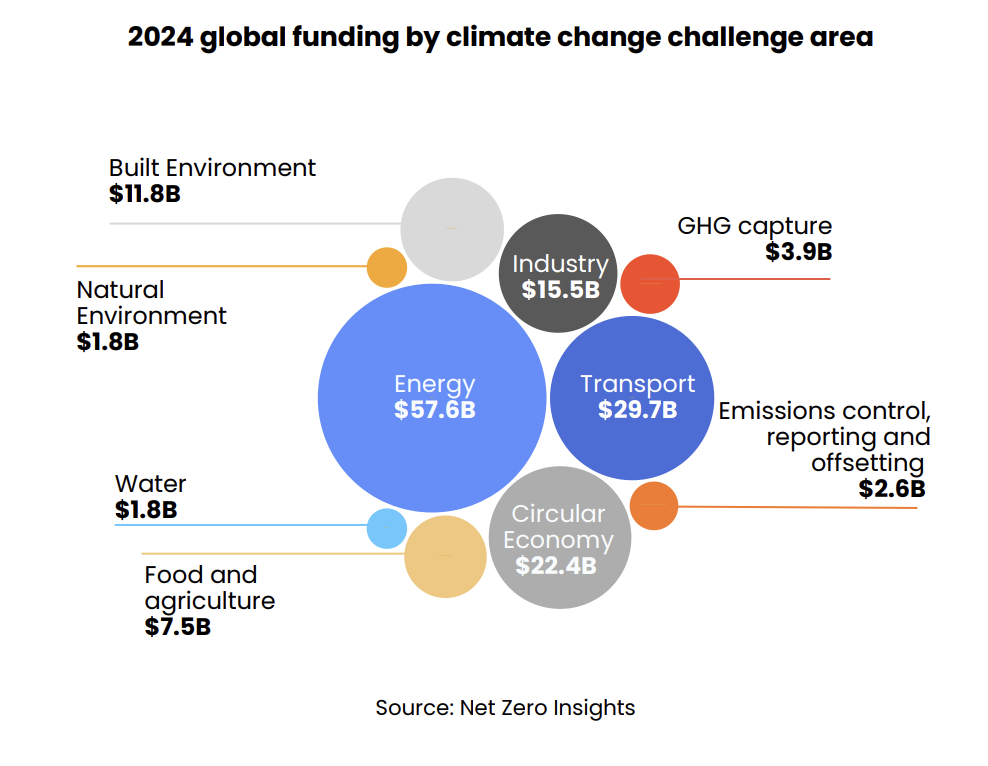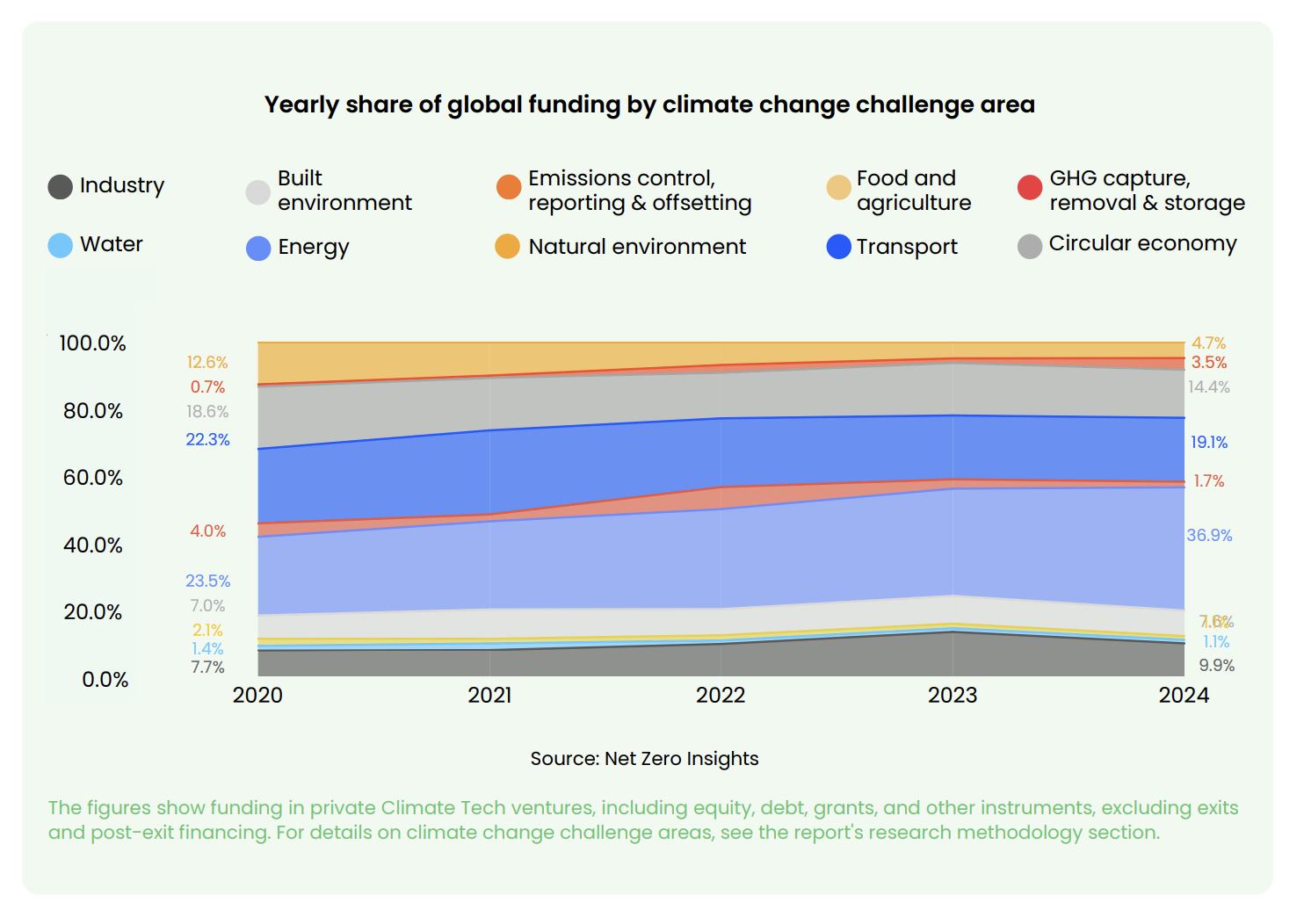In a year marked by financial turbulence and evolving priorities, the global Climate Tech ecosystem has shown resilience, albeit with significant shifts in funding trends. According to the State of Climate Tech 2024 (SOCT 2024) report by Net Zero Insights, equity funding in Climate Tech declined for the second consecutive year, while Europe overtook the United States as the global leader in funding, driven by an increase in debt financing.
A Robust Methodology
Net Zero Insights employed a rigorous methodology for the SOCT 2024 report, analyzing data from over 43,000 deals, 16,000 organizations, and 20,000 investors worldwide, spanning January 2020 to November 2024. “This report combines quantitative and qualitative analyses to offer a deep dive into the evolving Climate Tech investment landscape,” the report notes. The comprehensive analysis leverages a proprietary database of millions of data points to track trends and opportunities in the sector.
Key Highlights
Equity Funding Declines, Debt Rises
Global equity funding in Climate Tech fell 14% year-over-year in 2024, with early-stage ventures facing the greatest challenges. “Global equity investment fell 14% YoY since 2023, though the US and Europe remained stable,” the report states. Debt financing, however, surged to represent 41% of total funding, reflecting a shift toward more mature and scalable technologies.
This year, “debt financing plays an increasingly important role in scaling Climate Tech, funding almost 50% of physical solutions,” according to the report.
Federico Cristoforoni, Founder and Director Net Zero Insights, commented: “As we’ve meticulously tracked investment activity over the years, the Climate Tech ecosystem has shown rapid development, growth, and transformation—from the investment boom of 2021 to the resilience of 2022 and the downturn of 2023.”
Beyond the rise and fall of many remarkable companies,” he continued, “we’ve observed significant evolution in the investor landscape. Non-dilutive funding has emerged as a defining factor, particularly for financing solutions involving significant physical assets. This includes both lower-TRL technologies striving for demonstration and early commercialization, as well as market-ready solutions poised for scale and full adoption.

Europe Takes the Lead
For the first time, Europe surpassed the United States in total Climate Tech funding, securing $38.8 billion—a 45% year-over-year increase. This growth was primarily driven by eight of the year’s ten giga-rounds, which accounted for nearly half of Europe’s funding in 2024. “A surge in large debt financing rounds in early 2024 made Europe the global leader in total funding, surpassing the US for the first time,” the report reveals.
In contrast, the United States saw a modest 3% increase in total funding, with equity investment holding steady. The report points out that “the US dominates in funding breakthrough innovations,” emphasizing its focus on R&D-intensive technologies such as hydrogen and nuclear energy.
10 European giga-rounds:
The State of Climate Tech 2024 report identifies ten giga-rounds in Europe, all exceeding $1 billion in funding, which were primarily focused on scalable, market-ready solutions:
- Northvolt (Sweden): A $5 billion debt financing round for lithium-ion battery manufacturing, cementing Europe’s leadership in energy storage.
- Verkor (France): Secured $4.75 billion in debt for scaling battery production to meet increasing demand in the EV sector.
- District Heating (Germany): A $2.11 billion deal to expand district heating infrastructure, focusing on renewable and efficient energy systems.
- Nuclear Energy (France): $1.52 billion in debt financing aimed at advancing next-generation nuclear technologies.
- Lithium-Ion Batteries (Germany): Another $1.41 billion round, highlighting continued investment in Europe’s battery manufacturing ecosystem.
- Solar and Heat Pumps (France): $1.2 billion for renewable energy solutions, particularly solar installations and heat pump technologies.
- Fuels and Heat (United Kingdom): A $1.05 billion investment into cleaner fuel alternatives and heating systems.
- Autonomous Vehicles and AI (United Kingdom): $1.05 billion in equity funding for AI-driven autonomous vehicle technologies.
- Electrofuel (Norway): $1.1 billion equity funding to scale up synthetic fuel production for reducing greenhouse gas emissions.
- Electric Vehicles (France): $1.12 billion in debt funding for expanding EV production and charging infrastructure
The Climate Tech Solutions Attracting the Most Funding
Batteries and Hydrogen Lead the Charge in Europe
Europe’s funding dominance in 2024 was heavily skewed toward scalable physical solutions like battery and hydrogen technologies. These sectors accounted for the majority of its giga-rounds, with notable deals including $5 billion in battery investments by Sweden-based Northvolt and $4.75 billion for Verkor, a French battery manufacturing startup. These investments underscore Europe’s commitment to scaling proven, market-ready solutions to drive decarbonization in energy and transport.
“Battery and hydrogen-based solutions dominated debt financing in 2024,” the report states. Investments in these sectors highlight investor confidence in their scalability and readiness for widespread adoption. The focus on batteries also reflects Europe’s strategic emphasis on enhancing energy storage capacity, a critical component of its renewable energy transition.

U.S. Focuses on Breakthrough Technologies
While Europe led in funding for market-ready solutions, the United States maintained its position as the global leader in breakthrough innovations. The report highlights that “in the last five years, US companies developing R&D-intensive technologies raised more than twice the amount secured in Europe.”
The U.S. funneled significant investment into hydrogen and nuclear energy, with deals like $1.1 billion for Infinium to scale low-carbon electrofuels and $500 million for X-energy to advance nuclear reactor technologies. These investments reflect a long-term strategy to address deep decarbonization challenges through high-impact innovations.
Regional Focus on Transport and Energy
Globally, transport and energy remained the most funded sectors in 2024. “Since 2020, investments have increasingly focused on energy solutions, with 2024 seeing significant funding for battery technologies, solar energy and hydrogen,” the report notes. The transport sector, which includes electric vehicles (EVs) and charging infrastructure, followed closely, driven by the growing adoption of EVs and the need for robust charging networks.
In Europe, investments in transport logistics gained traction as part of broader efforts to decarbonize supply chains. Meanwhile, the U.S. prioritized long-duration energy storage and fusion energy, reinforcing its focus on next-generation technologies.

Investor Optimism
Despite the challenges, the report captures a sense of optimism among stakeholders. “70% of surveyed investors remain optimistic, anticipating increased capital flows into Climate Tech,” it states. This sentiment underscores confidence in the sector’s long-term potential.
Corporate participation has also increased, with 60% of surveyed companies predicting a rise in mergers and acquisitions (M&A) activity in the next two to three years. “Corporations ramped up their M&A activity in 2024, with 60% of respondents…indicating plans to further intensify their M&A strategies over the next 2 to 3 years,” the report highlights.
Challenges Ahead
The funding environment remains challenging, particularly for early-stage ventures. “60% of surveyed founders cited challenges in fundraising, including limited follow-on capital and a shortage of industry-specific investors,” the report states.
Certain sectors, such as energy and transport, continue to dominate funding, but other critical areas like water and greenhouse gas capture remain underfunded. “Despite a clear technological investment focus, industry experts recommend a holistic approach to Climate Tech deployment—one that prioritizes market needs instead of overly focusing on any single solution category,” the report advises.

Standing at a Crossroads
The State of Climate Tech 2024 provides a comprehensive view of a sector at a crossroads. As the report emphasizes, “achieving the necessary progress to enable the transition demands an even greater scale of effort—and participation from all market players is essential.” With increased collaboration and innovative funding mechanisms, Climate Tech is poised to play a pivotal role in the global transition toward a sustainable future.
For more insights and detailed data, the full SOCT 2024 report is available on the Net Zero Insights website.




